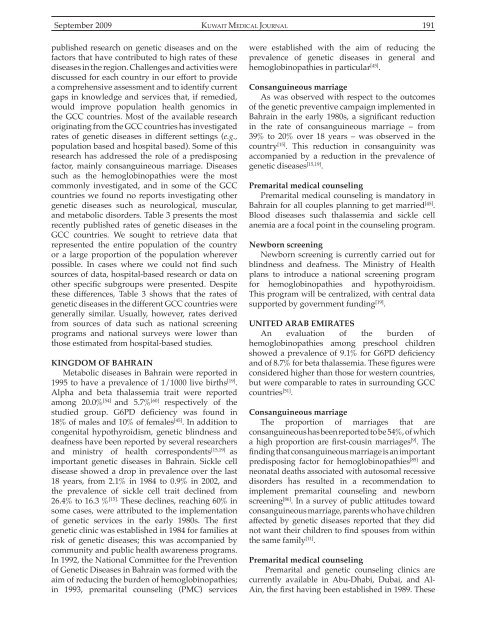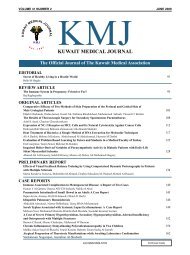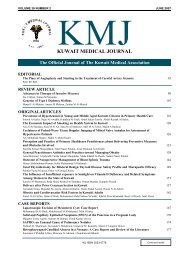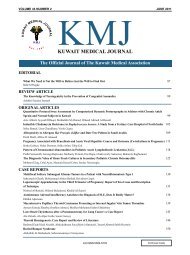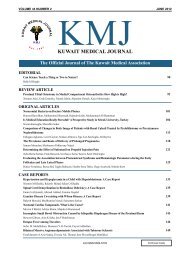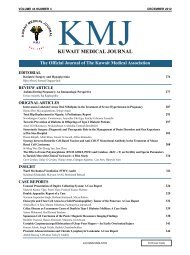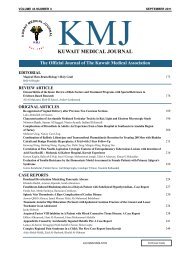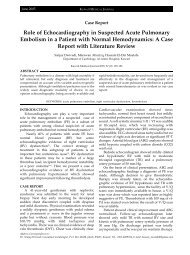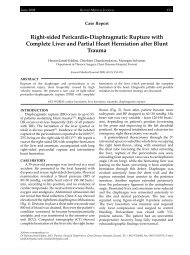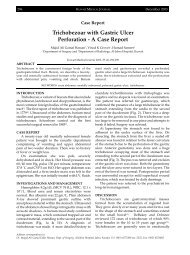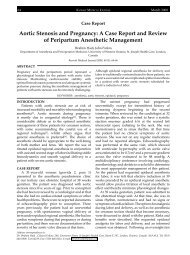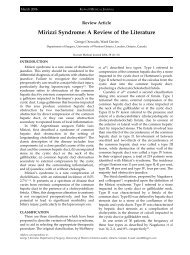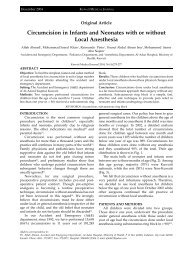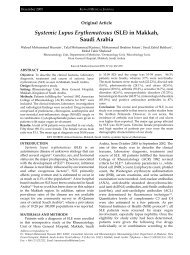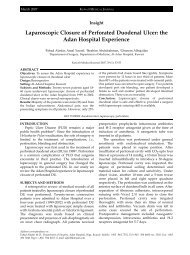Vol 41 # 3 September 2009 - Kma.org.kw
Vol 41 # 3 September 2009 - Kma.org.kw
Vol 41 # 3 September 2009 - Kma.org.kw
Create successful ePaper yourself
Turn your PDF publications into a flip-book with our unique Google optimized e-Paper software.
<strong>September</strong> <strong>2009</strong><br />
KUWAIT MEDICAL JOURNAL 191<br />
published research on genetic diseases and on the<br />
factors that have contributed to high rates of these<br />
diseases in the region. Challenges and activities were<br />
discussed for each country in our effort to provide<br />
a comprehensive assessment and to identify current<br />
gaps in knowledge and services that, if remedied,<br />
would improve population health genomics in<br />
the GCC countries. Most of the available research<br />
originating from the GCC countries has investigated<br />
rates of genetic diseases in different settings (e.g.,<br />
population based and hospital based). Some of this<br />
research has addressed the role of a predisposing<br />
factor, mainly consanguineous marriage. Diseases<br />
such as the hemoglobinopathies were the most<br />
commonly investigated, and in some of the GCC<br />
countries we found no reports investigating other<br />
genetic diseases such as neurological, muscular,<br />
and metabolic disorders. Table 3 presents the most<br />
recently published rates of genetic diseases in the<br />
GCC countries. We sought to retrieve data that<br />
represented the entire population of the country<br />
or a large proportion of the population wherever<br />
possible. In cases where we could not find such<br />
sources of data, hospital-based research or data on<br />
other specific subgroups were presented. Despite<br />
these differences, Table 3 shows that the rates of<br />
genetic diseases in the different GCC countries were<br />
generally similar. Usually, however, rates derived<br />
from sources of data such as national screening<br />
programs and national surveys were lower than<br />
those estimated from hospital-based studies.<br />
KINGDOM OF BAHRAIN<br />
Metabolic diseases in Bahrain were reported in<br />
1995 to have a prevalence of 1/1000 live births [19] .<br />
Alpha and beta thalassemia trait were reported<br />
among 20.0% [54] and 5.7% [60] respectively of the<br />
studied group. G6PD deficiency was found in<br />
18% of males and 10% of females [45] . In addition to<br />
congenital hypothyroidism, genetic blindness and<br />
deafness have been reported by several researchers<br />
and ministry of health correspondents [15,19] as<br />
important genetic diseases in Bahrain. Sickle cell<br />
disease showed a drop in prevalence over the last<br />
18 years, from 2.1% in 1984 to 0.9% in 2002, and<br />
the prevalence of sickle cell trait declined from<br />
26.4% to 16.3 % [15]. These declines, reaching 60% in<br />
some cases, were attributed to the implementation<br />
of genetic services in the early 1980s. The first<br />
genetic clinic was established in 1984 for families at<br />
risk of genetic diseases; this was accompanied by<br />
community and public health awareness programs.<br />
In 1992, the National Committee for the Prevention<br />
of Genetic Diseases in Bahrain was formed with the<br />
aim of reducing the burden of hemoglobinopathies;<br />
in 1993, premarital counseling (PMC) services<br />
were established with the aim of reducing the<br />
prevalence of genetic diseases in general and<br />
hemoglobinopathies in particular [45] .<br />
Consanguineous marriage<br />
As was observed with respect to the outcomes<br />
of the genetic preventive campaign implemented in<br />
Bahrain in the early 1980s, a significant reduction<br />
in the rate of consanguineous marriage – from<br />
39% to 20% over 18 years – was observed in the<br />
country [15] . This reduction in consanguinity was<br />
accompanied by a reduction in the prevalence of<br />
genetic diseases [15,19] .<br />
Premarital medical counseling<br />
Premarital medical counseling is mandatory in<br />
Bahrain for all couples planning to get married [45] .<br />
Blood diseases such thalassemia and sickle cell<br />
anemia are a focal point in the counseling program.<br />
Newborn screening<br />
Newborn screening is currently carried out for<br />
blindness and deafness. The Ministry of Health<br />
plans to introduce a national screening program<br />
for hemoglobinopathies and hypothyroidism.<br />
This program will be centralized, with central data<br />
supported by government funding [19] .<br />
UNITED ARAB EMIRATES<br />
An evaluation of the burden of<br />
hemoglobinopathies among preschool children<br />
showed a prevalence of 9.1% for G6PD deficiency<br />
and of 8.7% for beta thalassemia. These figures were<br />
considered higher than those for western countries,<br />
but were comparable to rates in surrounding GCC<br />
countries [51] .<br />
Consanguineous marriage<br />
The proportion of marriages that are<br />
consanguineous has been reported to be 54%, of which<br />
a high proportion are first-cousin marriages [9] . The<br />
finding that consanguineous marriage is an important<br />
predisposing factor for hemoglobinopathies [85] and<br />
neonatal deaths associated with autosomal recessive<br />
disorders has resulted in a recommendation to<br />
implement premarital counseling and newborn<br />
screening [86] . In a survey of public attitudes toward<br />
consanguineous marriage, parents who have children<br />
affected by genetic diseases reported that they did<br />
not want their children to find spouses from within<br />
the same family [11] .<br />
Premarital medical counseling<br />
Premarital and genetic counseling clinics are<br />
currently available in Abu-Dhabi, Dubai, and Al-<br />
Ain, the first having been established in 1989. These


